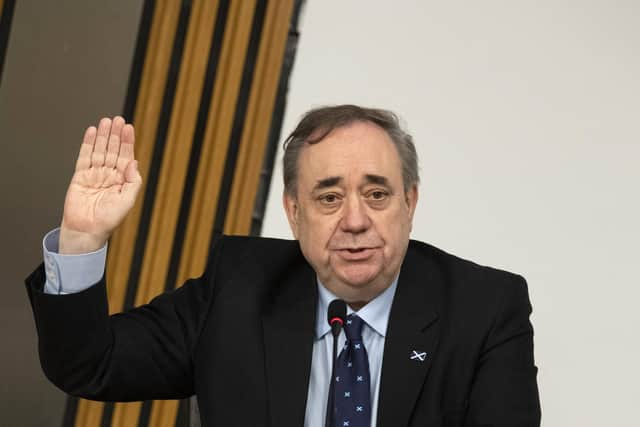Salmond Inquiry found no evidence of conspiracy against ex-First Minister but plenty of lessons for Nicola Sturgeon that cannot be dismissed – Murdo Fraser MSP
In words which could have been lifted straight from a Donald Trump tweet, a spokesperson for the First Minister accused committee members of resorting to “baseless assertion, supposition and smear”.
This was from the same First Minister who had promised full cooperation with the committee’s work, and two years ago said she would fully respect the work of the investigations that had been established.
Advertisement
Hide AdAdvertisement
Hide AdThe base cynicism of these earlier comments is now made evident by the First Minister’s reaction to what is a detailed, balanced and considered piece of work.
The great majority of the conclusions found by the committee were agreed unanimously, and all were based on the evidence presented.
To accuse the committee of being partisan ignores the fact that its nine members included four from the SNP – including the convener – and a fifth, Andy Wightman, a supporter of Scottish independence and someone regarded as an individual not just of independent mind but also of considerable personal integrity.
The committee was established to determine what went wrong with the government’s complaints process that badly let down two women who raised concerns about the behaviour of the former First Minister, and the defence of a legal challenge to that process which ended disastrously for the government, costing the tax payer over £500,000.


In nearly 200 pages of detailed analysis, the committee identifies the failings, and makes recommendations for the future that the Scottish government would do well to listen to, rather than dismiss out of hand.
From the very start, and contrary to the pledges of full cooperation from Nicola Sturgeon, the committee was obstructed in its work.
Nowhere was this more evident than in the case of the Scottish government’s legal advice which, despite two votes in Parliament, was withheld from the committee, and then only provided in part at the very last moment. The committee concludes that the government’s approach “substantially frustrated” its ability to get to the truth of the matter.
On the loss of the judicial review, the committee is clear that this was down to a significant failure to disclose vital documents, which led to the awarding of costs to Alex Salmond at the highest level possible. It is this failure that is perhaps the most damning of all the conclusions, and one for which no one has yet been held accountable, nor any resignations offered.


Advertisement
Hide AdAdvertisement
Hide AdIn view of the concern that has been expressed about leaks from the committee, there are two much more serious leaks of information from the government itself that the report highlights.
Firstly, there was the leak of the name of one of the complainers by a senior Scottish Government employee to Mr Salmond’s team, an appalling breach of confidentiality.
Even more seriously was the leak from within the Scottish government to the Daily Record newspaper of the details of the allegations against the former First Minister, which took an incredible toll on the two complainers.
Despite an investigation, no one within the Scottish government has been identified as being responsible for a hugely serious – and potentially criminal – act.
It was in relation to the findings on whether the First Minister broke the Ministerial Code that the committee divided, voting by five to four on three key issues: firstly that it was hard to believe the First Minister’s statement that she had no knowledge of concerns about Mr Salmond’s behaviour before March 2018; secondly that she misled the committee in her account of the first meeting with Alex Salmond in relation to an offer to intervene in the process, and thirdly in her failure to advise the Permanent Secretary of the meetings with Salmond earlier than she did, in breach of the Ministerial Code.
In coming to these conclusions, the majority of the committee were simply following the evidence that had been presented to us. When given two competing versions of events, committee members were entitled to consider whose evidence it could give the most weight to, and in that respect the existence of corroboration from significant and trustworthy individuals meant we had to support the contentions from Mr Salmond’s side.
That does not mean that the committee bought all of Mr Salmond’s claims. He and his supporters essentially claim that there was a conspiracy against him, by leading figures in the SNP and the Scottish government, to tarnish his reputation and even see him sent to jail.
The best that can be said of this case is that it is not proven. The committee saw no convincing evidence that this conspiracy existed, and the notion that the women complainers who raised the original concerns were part of a plotting cabal against the former First Minister is simply risible.
Advertisement
Hide AdAdvertisement
Hide AdThere are other issues arising from this whole sorry affair that the committee reached conclusions on – the need for, in future, such inquiries to be led by a judge who would have access to information that we were simply not able to reach; and the requirement to address the dual role of the Lord Advocate as both legal adviser to the Scottish government and head of the independent Crown Office and Procurator Fiscal service.
Overall, this is a serious and detailed report with important lessons to be learned by the Scottish government. It also demands that those responsible for the failings that we have seen over the past three years should be held to account for them.
Simply seeking to brush these findings under the carpet, and respond with Trumpian denunciations of opposition “smears” will do a great disservice to all involved in this process, and in particular those whose complaints have still yet to be properly addressed.
Murdo Fraser is a Scottish Conservative MSP for Mid-Scotland and Fife
A message from the Editor:
Thank you for reading this article. We're more reliant on your support than ever as the shift in consumer habits brought about by coronavirus impacts our advertisers.
If you haven't already, please consider supporting our trusted, fact-checked journalism by taking out a digital subscription.
Comments
Want to join the conversation? Please or to comment on this article.